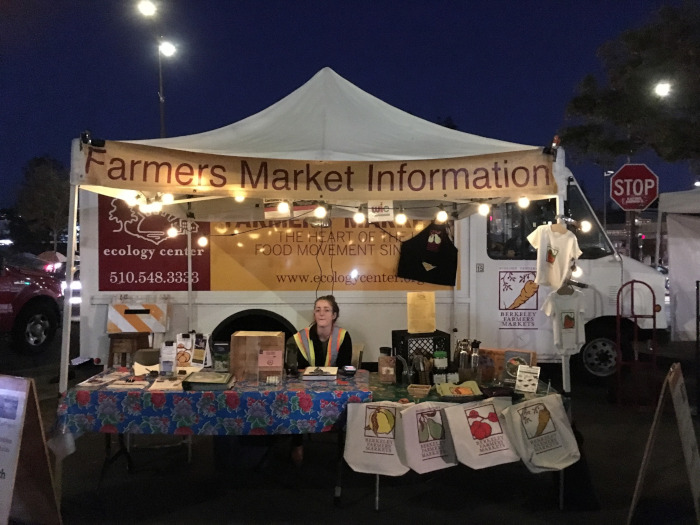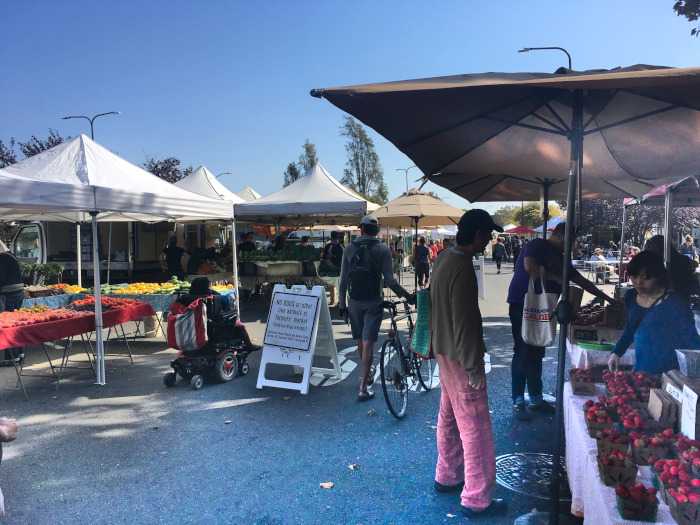Written by Sam Phillips
Fall 2018
We lie deeply embedded in a consumerist society which continues to serve injustices on every plate. People throughout the system– from producer to consumer– are treated unfairly by the capitalist marketplace. Institutionally, sustainable production practices are disincentivized, and for a significant group of people, a healthy diet is unattainable. From the classroom, I have learned that the modern food system creates inequity and does not account for the disparities it creates. However, I have found that the Berkeley Farmers’ Markets are a unique hiding place within this system for a range of consumers who seek and support healthy, local food, and for producers who grow with a holistic mindset.
I spent a season working with the Ecology Center, which is a nonprofit that hosts several types of food markets, including the Berkeley Farmers’ Markets, the Berkeley Farm Stand, and Farm Fresh Choice. Initially, the greatest challenge I faced with the Ecology Center was in considering whether my work was in-line with my morals or not. The last thing I wanted was to assist the efforts of profit-driven people, or to work in a way that ignored those who are underserved. Farmers’ markets tend to have a rap as elitist markets, because farmers often ask for more than grocery stores in order to support their practice, and many of these markets do become elitist. They might eventually be dominated by high-end value-added products, or simply just expensive produce. I wasn’t sure what the Berkeley Farmers’ Markets were, and I feared that I was entering an organization that hosted a market for the rich. As time went on, I became friends with several staff and vendors and began to hear their stories, finding that their ideals were similar to mine. I say that the markets put on by the Ecology Center are unique because the staff are driven to promote equity in a system which defies it. Their markets intentionally serve a community of people with healthy food, by providing services and prices that make the produce more available to those who would otherwise be disincentivized to buy it.
I developed several strong relationships during my internship with the Ecology Center, and I hope to maintain contact with the people I met. I went to the Ecology Center to serve hours for this class, and found that I couldn’t leave after my hours were done, or rather, I couldn’t get myself to leave. The more days I spent in the farmers’ market, the deeper my connection to the community within the market became. Over the course of my internship, to name a few things, I developed profiles for the vendors, worked on marketing campaigns, and used geospatial data to improve outreach for CalFresh users. Sure, I finished my projects, but they weren’t finished to me. My work became embedded in my person, and I felt that I needed to see their fruition, to fix the bugs, and to communicate with others about what I had done. I learned in market that everything is an exchange. Relationships develop from both sides, and food can trade hands because of currency, friendship, or an inquiry. Most importantly, as you give to a community, it gives back to you. It would feel wrong to abandon the market, the nonprofit, and the people I have become so tied to.
I remember watching the seasons change in market- various types of produce (fruit especially) came in and out of season, and vendors came and went with them. One week, pears appeared at the market, and a month later, the persimmons came. Though the persimmons were grown one hundred miles away, the weather in Berkeley felt right for their arrival. The air was cold and cloudy, and the rain could be felt on the wind. The market is open air, which to me causes the food to feel as though it is the result of an ecological process, and not commodity production.
Food is an experience, and an art form. Its history is inextricably tied to the people and environment which brought it into creation. The farmers’ market is more than just a place for food, it is a central location for trading knowledge and storytelling. Every week in the market I would hear people ask “What is this?” or “How do you like to cook it?”, and on rare occasions, I would hear someone say: “How did you get into farming?”, or some other very specific question. I began to realize I had the same inquiries, but I had never felt like I could ask those questions to someone at a grocery store. People in the farmers’ market are enabled to trade information, and to hear some very powerful stories about struggle and success beyond produce. This was the main focus of my work with the Ecology Center. I wanted to enable customers to think more about where, when, and who their food came from by designing a new vendor profile for each stand in market. The profiles contain a personal statement from the farm, management information, farm specialties, and statistics about their operation. It is meant to provide the opportunity for customers to ask more questions- which I think is one of the biggest appeals of the market; the ability to say “I know where this came from”. The face to face interaction of the farmers market prevents the food from becoming anonymous, and attaches its story to its flavor.
During my time with the Ecology Center at the Berkeley Farmers’ Markets, it was easy to get lost in the romance of the food, the people, and the stories they both told. But we cannot forget who is missing from the picture, and who is systematically excluded from such an experience. In this society, our governmental structures force us to tackle the inequalities in the food system on our own, and we must do so where we can. No nonprofit can fix the food system, but it can alleviate the pain. I have learned that there are disparities in every community, and that any way you can positively affect a community is a measurable impact and an example. The most important lesson I take away from my internship is this: we cannot change the system in a day, but we can make a change in our neighborhoods every day. I think we all must take our education as far as it can go to initiate positive local change.


